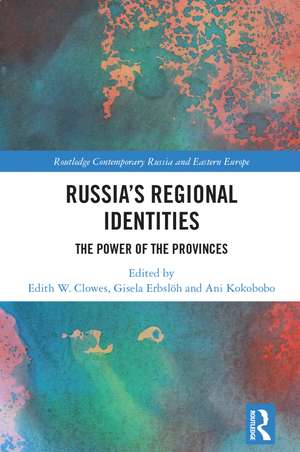Russia's Regional Identities: The Power of the Provinces: Routledge Contemporary Russia and Eastern Europe Series
Editat de Edith Clowes, Gisela Erbslöh, Ani Kokoboboen Limba Engleză Hardback – 23 ian 2018
| Toate formatele și edițiile | Preț | Express |
|---|---|---|
| Paperback (1) | 389.38 lei 43-57 zile | |
| Taylor & Francis – 12 mai 2020 | 389.38 lei 43-57 zile | |
| Hardback (1) | 1277.27 lei 43-57 zile | |
| Taylor & Francis – 23 ian 2018 | 1277.27 lei 43-57 zile |
Din seria Routledge Contemporary Russia and Eastern Europe Series
-
 Preț: 326.15 lei
Preț: 326.15 lei -
 Preț: 325.21 lei
Preț: 325.21 lei -
 Preț: 326.49 lei
Preț: 326.49 lei -
 Preț: 309.79 lei
Preț: 309.79 lei -
 Preț: 321.03 lei
Preț: 321.03 lei -
 Preț: 326.56 lei
Preț: 326.56 lei - 9%
 Preț: 934.69 lei
Preț: 934.69 lei -
 Preț: 302.32 lei
Preț: 302.32 lei -
 Preț: 318.10 lei
Preț: 318.10 lei -
 Preț: 379.30 lei
Preț: 379.30 lei - 25%
 Preț: 824.70 lei
Preț: 824.70 lei - 18%
 Preț: 1058.79 lei
Preț: 1058.79 lei - 18%
 Preț: 1111.51 lei
Preț: 1111.51 lei - 18%
 Preț: 950.71 lei
Preț: 950.71 lei -
 Preț: 464.54 lei
Preț: 464.54 lei - 18%
 Preț: 1168.76 lei
Preț: 1168.76 lei - 16%
 Preț: 130.54 lei
Preț: 130.54 lei - 26%
 Preț: 821.46 lei
Preț: 821.46 lei - 18%
 Preț: 1169.78 lei
Preț: 1169.78 lei -
 Preț: 413.98 lei
Preț: 413.98 lei -
 Preț: 387.49 lei
Preț: 387.49 lei -
 Preț: 396.90 lei
Preț: 396.90 lei - 18%
 Preț: 1064.01 lei
Preț: 1064.01 lei - 18%
 Preț: 1220.77 lei
Preț: 1220.77 lei -
 Preț: 418.13 lei
Preț: 418.13 lei - 18%
 Preț: 1060.87 lei
Preț: 1060.87 lei -
 Preț: 413.37 lei
Preț: 413.37 lei - 18%
 Preț: 707.96 lei
Preț: 707.96 lei - 18%
 Preț: 1058.65 lei
Preț: 1058.65 lei - 18%
 Preț: 948.84 lei
Preț: 948.84 lei - 18%
 Preț: 706.91 lei
Preț: 706.91 lei - 18%
 Preț: 1059.84 lei
Preț: 1059.84 lei -
 Preț: 488.33 lei
Preț: 488.33 lei - 18%
 Preț: 1056.28 lei
Preț: 1056.28 lei -
 Preț: 390.12 lei
Preț: 390.12 lei - 18%
 Preț: 1053.16 lei
Preț: 1053.16 lei - 18%
 Preț: 1056.28 lei
Preț: 1056.28 lei - 28%
 Preț: 850.91 lei
Preț: 850.91 lei - 18%
 Preț: 1171.89 lei
Preț: 1171.89 lei - 18%
 Preț: 1050.78 lei
Preț: 1050.78 lei - 18%
 Preț: 1166.68 lei
Preț: 1166.68 lei - 18%
 Preț: 1058.79 lei
Preț: 1058.79 lei - 18%
 Preț: 1971.48 lei
Preț: 1971.48 lei
Preț: 1277.27 lei
Preț vechi: 1557.65 lei
-18% Nou
Puncte Express: 1916
Preț estimativ în valută:
244.41€ • 255.82$ • 203.42£
244.41€ • 255.82$ • 203.42£
Carte tipărită la comandă
Livrare economică 31 martie-14 aprilie
Preluare comenzi: 021 569.72.76
Specificații
ISBN-13: 9781138201026
ISBN-10: 1138201022
Pagini: 306
Ilustrații: 18 Halftones, black and white; 1 Tables, black and white; 18 Illustrations, black and white
Dimensiuni: 156 x 234 x 19 mm
Greutate: 0.59 kg
Ediția:1
Editura: Taylor & Francis
Colecția Routledge
Seria Routledge Contemporary Russia and Eastern Europe Series
Locul publicării:Oxford, United Kingdom
ISBN-10: 1138201022
Pagini: 306
Ilustrații: 18 Halftones, black and white; 1 Tables, black and white; 18 Illustrations, black and white
Dimensiuni: 156 x 234 x 19 mm
Greutate: 0.59 kg
Ediția:1
Editura: Taylor & Francis
Colecția Routledge
Seria Routledge Contemporary Russia and Eastern Europe Series
Locul publicării:Oxford, United Kingdom
Cuprins
Introduction, Part I: Framing Russia’s Regions, 1. "The Six Waves of Russian Regionalism in European Context, 1830-2000", 2. "Provinces, Regions, Circles, Grids: How Literature Has Shaped Russian Geographical Identity", Part II: Rethinking European Russian Identities, 3. "Militarized Memory: Patriotic Re-branding in Post-Soviet Pskov", 4. "Wayfinding, Map-making and the Holy Springs of the Orel Region", 5. "‘How is Voronezh not Paris?’ City Branding in the Russian Provinces", Part III: Russian Identities in the Urals 6. "The Strange Case of a Regional Cultural Revolution: Sverdlovsk in the Perestroika Years", 7. "Enchanted Geographies: Aleksei Ivanov and the Aesthetic Management of Ural Regional Identity", Part IV: Russian Identities in Siberia, 8. "Siberian Regional Identity: Self-Perception, Solidarity, or Political Claim?", 9. "Tomsk Regional Identity and the Legacy of the Gulag and Stalinist Repression" Part V: Regional Identities outside the Orthodox Zone, 10. "National Identity in Post-Soviet Tatarstan: Orthodox Missionaries in Twenty-First Century Tatar Literature and Film", 11. "Women, Memory, and Resistance: Dealing with the Soviet Past in the Volga-Ural Region", 12. "‘Why Does Russia Need Hadji Murat’s Head?’ Hadji Murat, Dagestani Identity, and Russia’s Colonial Exploits", Afterword: "The Power of the Provinces".
Notă biografică
Edith W Clowes is a Professor in the Department of Slavic Languages and Literatures at the University of Virginia, Charlottesville, USA.
Gisela Erbslöh is a freelance journalist and literary critic, who has written extensively on Russian, Belorussian, and Northern Caucasian culture, history and social life
Ani Kokobobo is Director of Graduate Studies in the Department of Slavic Languages and Literatures at the University of Kansas, USA.
Gisela Erbslöh is a freelance journalist and literary critic, who has written extensively on Russian, Belorussian, and Northern Caucasian culture, history and social life
Ani Kokobobo is Director of Graduate Studies in the Department of Slavic Languages and Literatures at the University of Kansas, USA.
Descriere
Contemporary Russia is often viewed as a centralised regime based in Moscow, with dependent provinces, made subservient by Putin’s policies limiting regional autonomy. This book, however, demonstrates that beyond this largely political view, by looking at Russia’s regions more in cultural and social terms, a quite different picture emerges, of a Russia rich in variety, with different regional identities, cultures, traditions and memories. The book explores how identities are formed and rethought in contemporary Russia, and outlines the nature of particular regional identities, from Siberia and the Urals to southern Russia, from the Russian heartland to the non-Russian republics.
